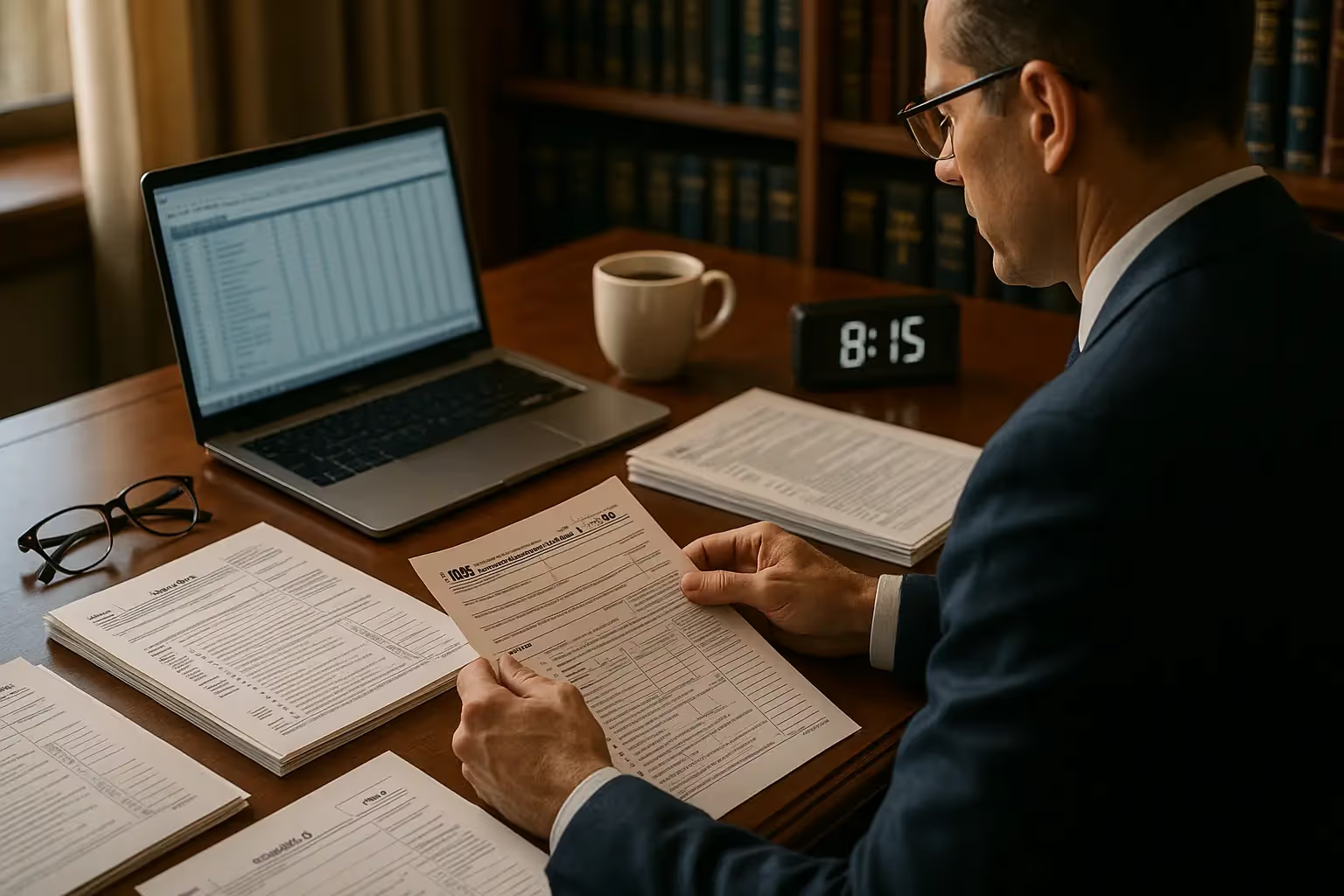
Filing an unfiled 2012 Form 945 matters because it ensures compliance with IRS requirements for reporting withheld federal income tax. Small business owners who made nonpayroll payments in 2012 are directly responsible for completing this annual return correctly. Even if years have passed, the obligation to file does not expire. Completing the filing helps businesses avoid escalating enforcement actions.
Addressing past-due federal income tax obligations quickly is critical because penalties and interest accumulate daily, and the return remains unfiled. The longer the delay, the larger the balance grows, often exceeding the original liability. Filing the return starts the statute of limitations for collection, which protects business owners long-term. Acting now can stop additional costs from compounding further.
Ignoring an unfiled 2012 Form 945 exposes owners to serious risks, including the Trust Fund Recovery Penalty for withheld amounts. Penalties can reach 25% of unpaid tax, and daily interest compounds over a decade. In severe cases, responsible individuals may face personal liability. This guide offers small business owners plain-English, step-by-step instructions to file Form 945, manage penalties, and resolve issues effectively.
Understanding Form 945 and Federal Income Tax Obligations
Filing Form 945 is critical because it reports withheld federal income tax from nonpayroll sources and certain taxable payments. Many small business owners confuse this annual return with employment taxes such as Social Security and Medicare taxes, but the obligations differ. Form 945 ensures that federal income tax withheld from independent contractors, pensions, gambling winnings, and other payments received is accurately reported. Ignoring an unfiled 2012 Form 945 exposes businesses to IRS scrutiny, penalties, and growing interest.
Annual Return Purpose: Reporting Withheld Federal Income Tax
- Federal income tax withheld: This return reports withheld federal income tax from nonemployee compensation and other taxable payments.
- Independent contractors: Employers must report payments to independent contractors when withholding tax obligations apply.
- Certain taxable payments: This includes real estate transactions, retirement distributions, gambling winnings, and nonemployee compensation.
- Information returns link: The data connects with Form W-2, Form W, and other information returns to match IRS records.
Key Difference Between Employment Taxes and Form 945 Obligations
- Social security and Medicare: Employment taxes include social security and Medicare taxes, reported quarterly on Form 941.
- Withholding tax scope: Form 945 covers backup withholding tax and other withholding taxes not tied to regular wage and tax statements.
- Backup withholding rate: Businesses must apply the IRS backup withholding rate when a payee fails to provide a correct TIN.
- Separate reporting: Employers must organize tax information to avoid confusing employment taxes with nonpayroll reporting requirements.
Filing Due Date and Consequences of Late Filing
- Timely filing is required: Form 945 is strictly due on January 31 following the tax year being reported.
- Returns filed late: Late filing can result in penalties and interest charges, especially if paid taxes are not deposited correctly.
- IRS issues notices: The IRS sends a notice when it detects missing or incorrect TINs or fails to file a form on time.
- Serious consequences: An unfiled 2012 Form 945 may trigger penalties for willful neglect, leading to long-term IRS issues.
Why an Unfiled 2012 Form 945 Still Requires Immediate Attention
- Taxpayer risk: Businesses with an unfiled 2012 Form 945 still owe federal tax on prior withholding tax obligations.
- Accrued penalties: Interest and penalties continue to grow until the tax return is filed and the payments received are reported.
- Reasonable cause: Filing now and showing reasonable cause can help reduce penalties for missing and incorrect name or TIN errors.
- Impact on the following year: Delayed compliance may affect the following year's filings and increase exposure to audits of various types of tax statements.
Form 945 plays a distinct role in reporting federal income tax withheld from nonpayroll taxable payments. Small business owners must recognize the difference between employment taxes and ensure timely filing to avoid costly IRS issues. Addressing an unfiled 2012 Form 945 immediately helps stop penalties from growing and restores compliance with federal tax laws and regulations.
Step-by-Step Guide to File Form 945 for 2012
Filing an unfiled 2012 Form 945 requires gathering precise records, using the correct documents, and following IRS procedures carefully. Each step matters because mistakes or omissions can cause further penalties, interest, or delays in resolving IRS issues. Below is a step-by-step process designed to help small business owners file accurately.
- Gather all 2012 records: Collect nonpayroll payment records, withholding tax details, information returns like Forms 1099 and W-2G, and IRS correspondence.
- Obtain the correct 2012 form: You can request the official 2012 version of the annual return Form 945 through IRS.gov or the IRS phone line.
- Calculate tax liability: Use 2012 records to determine total withheld federal income tax, deposits made, and any remaining balance due.
- Complete required schedules: If the total tax liability exceeded $2,500, attach the monthly liability schedule or complete Form 945-A.
- File by paper only: Submit the tax return through certified mail, keep copies, and follow the IRS-specific instructions for mailing addresses.
- Pay balance due: Use IRS-approved federal tax payment options such as EFTPS, check, or money order, and confirm timely deposits.
By following these steps, small business owners can successfully file Form 945, avoid additional penalties, and bring their businesses back into compliance with federal tax laws.
IRS Penalties and Interest for Late Filing of Form 945
When a business fails to file Form 945 on time, the IRS applies several penalties and interest charges. These penalties increase costs quickly, especially when combined with daily compounding interest on unpaid federal income tax. Understanding each type of penalty helps small business owners respond effectively to IRS notices.
Failure to File Penalty
- Rate applied: The IRS charges 5% of the unpaid federal tax, and a tax return remains unfiled each month.
- Maximum limit: This penalty can grow until it reaches 25% of the unpaid balance.
- Trigger event: The penalty applies when a person required to file Form 945 does not submit it by the due date.
- Business impact: An unfiled 2012 Form 945 may have reached maximum penalties after years of noncompliance.
Failure to Pay Penalty
- Rate applied: The IRS adds 0.5% of the unpaid tax liability each month, and the balance remains unpaid.
- Duration: Unlike the failure-to-file penalty, this one continues until all taxes are paid.
- Additional burden: If both penalties apply, the IRS reduces the failure-to-file penalty by the failure-to-pay portion.
- Practical example: A small business that delayed paying withheld income tax faced years of growing costs.
Failure to Deposit Penalties
- Short delays: Deposits made 1–5 days late incur a 2% penalty.
- Medium delays: Deposits 6–15 days late face a 5% penalty.
- Long delays: Deposits over 15 days late result in a 10% penalty.
- Final stage: If the IRS issues a notice and payment is not made within 10 days, a 15% penalty applies.
Interest on Unpaid Federal Income Tax
- Daily compounding: Interest on unpaid balances compounds every day until full payment is made.
- IRS calculation: The rate changes quarterly, based on federal short-term rates plus 3%.
- Extended period: A 2012 tax year balance accumulates over a decade of interest.
- Business consequence: Interest and penalties can easily double the original withholding tax owed.
Accuracy-Related Penalties
- Negligence cases: A 20% penalty applies if the IRS finds negligence or disregard for tax laws.
- Substantial understatement: Businesses that significantly underreport income tax may trigger this penalty.
- IRS authority: The IRS applies this penalty even if returns filed show partial compliance.
- Prevention: Maintaining proper tax information and using correct TINs helps avoid these charges.
The IRS enforces a strict penalty system for late or unfiled Form 945 returns. The combination of late filing penalties, payment penalties, deposit failures, and compounded interest creates a significant financial burden. Addressing these obligations immediately can reduce exposure, stop growing charges, and help businesses return to compliance with federal tax laws.
Trust Fund Recovery Penalty and Social Security Tax Risks
The Trust Fund Recovery Penalty (TFRP) is among the harshest penalties the IRS can assess against a business. It equals 100% of the unpaid withheld income tax, making the liability extremely burdensome. The IRS applies it when businesses fail to remit taxes withheld from wages or other payments. This penalty transforms a company’s tax mistake into a financial crisis for individuals in control.
The TFRP is not limited to the business entity itself, but extends to individuals with responsibility. Owners, corporate officers, accountants, bookkeepers, and even lenders can face liability if they had authority over funds. The IRS decides based on who controlled financial decisions, not just who signed checks. This broad scope makes almost any decision-maker a potential target.
Although the TFRP is separate from Social Security and Medicare taxes, mismanagement of either obligation can produce severe consequences. The IRS views failure to remit withheld funds as willful neglect of tax laws. Immediate response, complete documentation, and professional representation are vital when facing a TFRP investigation. Acting quickly helps protect business owners from escalating penalties, interest, and long-term IRS issues.
Resolution Options for Small Business Owners with an Unfiled 2012 Form 945
Small business owners who discover an unfiled 2012 Form 945 still have several ways to resolve their situation with the IRS. The right choice depends on the total balance, compliance history, and the business’s ability to pay. Below are the most common options taxpayers can use to address unpaid federal tax and bring their accounts back into compliance.
Installment Agreements
- Streamlined agreements: Taxpayers owing $25,000 or less may qualify for simplified installment plans with minimal financial disclosure.
- Traditional agreements: Larger debts require submitting financial statements and undergoing a full IRS review before approval.
- Partial payment plans: Businesses unable to pay in full may qualify for reduced monthly payments that cover part of the liability.
- Long-term relief: These agreements prevent aggressive collection actions as long as payments remain current.
Penalty Abatement
- First-time abatement: Taxpayers with a clean history for the prior three years may request a one-time waiver of penalties.
- Reasonable cause relief: Serious illness, natural disasters, or inability to obtain records may justify penalty reductions.
- Statutory exceptions: Specific rules in the tax code allow relief in defined situations, such as incorrect IRS advice.
- Supporting documentation: Requests must include evidence proving circumstances outside the taxpayer’s control.
Offer in Compromise
- Reduced settlement: Taxpayers may settle for less than the full balance when paying in full is impossible.
- Grounds for acceptance: Offers may be based on doubt regarding collectibility, liability, or effective tax administration.
- Strict requirements: All required tax returns must be filed before the IRS considers the request.
- Lengthy process: Reviews can take months, but successful offers permanently relieve overwhelming debt.
Currently Not Collectible (CNC) Status
- Financial hardship: Businesses that cannot cover living expenses and tax payments may request CNC status.
- IRS review: Taxpayers must submit income, expense, and asset details for IRS evaluation.
- Temporary suspension: The IRS halts active collection efforts while penalties and interest accrue.
- Periodic monitoring: The IRS may revisit the business’s finances to determine if payment ability has improved.
Choosing the Right Option
- Liability size: The amount owed often determines whether an installment plan, OIC, or CNC is most realistic.
- Employment tax history: Businesses with repeat noncompliance may face tougher scrutiny and fewer relief options.
- Professional guidance: Tax professionals help assess eligibility and prepare strong applications for relief programs.
- IRS cooperation: Demonstrating good faith compliance increases the likelihood of securing favorable terms.
Small business owners with an unfiled 2012 Form 945 are not without solutions. Options like installment agreements, penalty abatements, offers in compromise, and CNC status provide different levels of relief. The best choice depends on financial capacity, compliance record, and IRS requirements. Acting quickly allows businesses to stop penalties from increasing and regain control of their federal tax situation.
Taking Action and Moving Forward with IRS Compliance
Filing an unfiled 2012 Form 945 immediately stops additional penalties from increasing and limits future financial exposure. The IRS requires businesses to submit overdue tax returns before negotiating payment or settlement. The filing demonstrates that the taxpayer accepts responsibility and intends to resolve the matter. This first step begins the process of restoring compliance with federal tax laws.
The IRS generally cooperates with taxpayers who show good faith and make timely efforts to address outstanding obligations. Compliance through accurate filing is always the foundation before any negotiation for payment relief. Submitting the return first prevents delays when applying for installment agreements or penalty abatements. By showing cooperation, taxpayers increase their chances of securing favorable terms.
Complex cases involving large debts, potential Trust Fund Recovery Penalty exposure, or mismanaged employment taxes often require professional representation. Experienced tax professionals can prepare filings, handle IRS communication, and present strong arguments for relief. Seeking experts to help reduce errors and increase success in negotiations. The first step, filing or hiring representation, is the most important action toward compliance and resolution.
FAQs
Can I still file Form 945 for 2012 even though it’s past the due date?
Yes, you can still file a 2012 Form 945 even though the original deadline has passed. The IRS requires every return to be filed, regardless of age, and unfiled returns have no statute of limitations. Filing stops the failure-to-file penalty from further compounding and starts the collection statute clock. Submitting the overdue return shows good faith, which may improve eligibility for relief options like penalty abatement.
What if I don’t have all my 2012 information returns?
If your 2012 records are incomplete, you should reconstruct them as best as possible and file the return anyway. Bank statements, copies of 1099s, or payroll system archives can help rebuild tax information. The IRS can also provide transcripts showing reported payments and withholding. Filing a return based on good faith estimates is far better than not filing. The IRS prefers a timely, reasonable filing over continued noncompliance or missing forms.
How much will penalties and interest add up to on unpaid federal tax?
The total cost depends on your 2012 tax liability and how long it remained unpaid. Generally, the failure-to-file penalty is 5% per month up to 25%, and the failure-to-pay penalty adds 0.5% monthly until paid. Interest compounds daily at IRS-set rates that have changed quarterly over the past 12 years. Combined penalties and interest can easily exceed the original balance, often doubling or more, depending on deposits, notices, and collection activity since 2012.
Can I negotiate with the IRS before filing the annual return?
No, you cannot negotiate directly with the IRS before you file your overdue Form 945. The IRS requires all annual returns to be on record before considering relief options like installment agreements, offers in compromise, or penalty abatements. Filing first demonstrates compliance and good faith. Once your return is processed, you can negotiate payment arrangements or reductions. Filing the return is the foundation for any successful resolution strategy with the IRS.
What if the IRS already filed a substitute Form 945?
If the IRS filed a substitute for return (SFR) on your behalf, it likely overstated your liability because deductions and credits were not applied. You should file your own completed 2012 Form 945, a superseding return, to replace the IRS’s estimate. This ensures you are only liable for the correct amount of withholding tax. Filing your return may significantly reduce the balance owed and is the IRS-preferred method for correcting substitute assessments.



.avif)


.avif)













































































